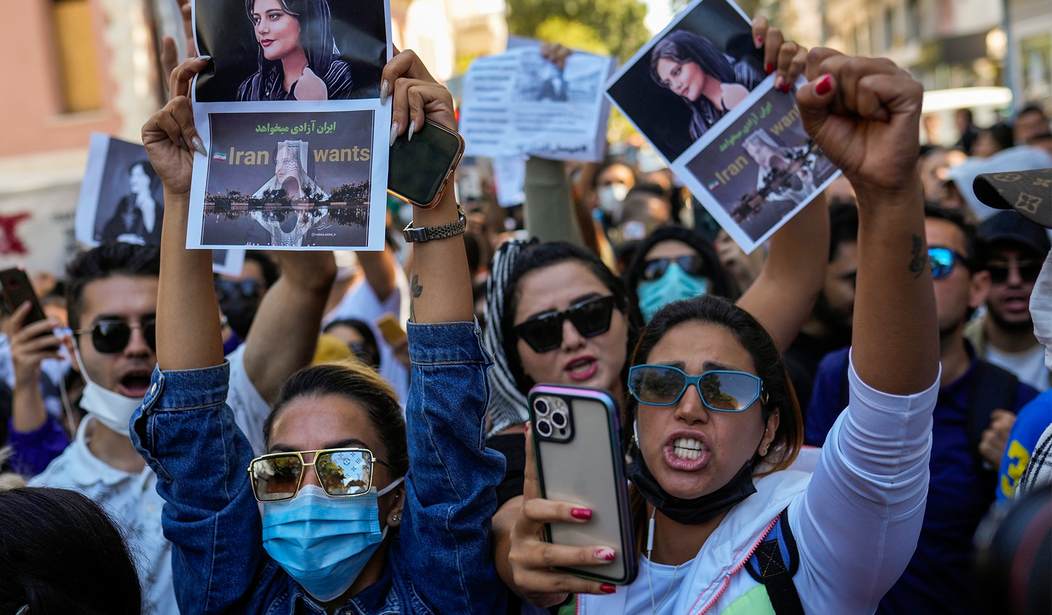How about some good old-fashioned food poisoning as a tool to keep college students in line? That appears to be the choice of action taken by the Iranian regime as 1,200 students at Kharazmi and Ark universities became ill. Their symptoms were vomiting, severe body aches and hallucinations. Students in at least four other universities reported the same. This happened on the eve of mass anti-regime protests this week.
The news was reported by ISNA, an Iranian news agency. Iranian science ministry confirmed that the students had food poisoning.
The Iranian science ministry confirmed that the students were struck by food poisoning, which has led to students protesting by dumping their food onto pavements. Video footage posted online over the weekend showed row upon row of plastic bags containing canteen food placed on the ground outside Ark university.
The Iranian regime has been accused of deliberately poisoning students to thwart their latest protest, while Iranian authorities have blamed accidental food poisoning linked to an outbreak of water-borne bacteria in the country.
“Our past experiences of similar incidents at the Isfahan university negates the authorities’ reason for this mass food poisoning,” a statement from Iran’s national student union said.
The student union has also claimed the universities’ clinics have closed or suddenly run out of electrolytes which has made it harder to treat dehydration – a common symptom of food poisoning. Meanwhile, female students have been told to remain inside their dormitories at some universities.
Iranians have called for a three-day strike period to begin Wednesday in protest of the Iranian regime. The protests, which began in September after the death of Mahsa Amini, a 22-year-old Kurdish-Iranian woman, who was accused of violating the dress code by the morality police. She was arrested, beaten by police, and died in jail. Since then, Iranian women have taken to the streets in protest, burning their hijabs, shouting anti-regime slogans, and cutting off their hair in defiance of the regime. What is interesting is that, though this is not the first time that protests have broken out in Iran against its brutal theocracy, this is the first time the protests have continued for a prolonged length of time and these protests are being led by women. They are not backing down, in fact, they are gaining support.
The Ayatollah and his henchmen are growing desperate to stop the protests and that means its a dangerous time for the women. The idea of considering a change in the hijab law is being discussed by the parliament and the judiciary. It may take two or three weeks for a decision. There have been some draconian measures taken already. In November, the Ayatollah Ali Khamenei led Iranian lawmakers to vote in favor of executing 15,000 protesters for participating in the protests. Iranian security forces fire live ammunition at protesters. The families of the Iranian World Cup team were threatened if the team members acted out in protest, as they did when they refused to sing the national anthem before their first match.
There were even rumors that the morality police may be scrapped but that was just malarkey.
“No official in the Islamic Republic of Iran has confirmed the closure of the morality police,” claimed a report by the Al-Alam broadcaster on Sunday night. “Some foreign media have tried to characterise the attorney general’s statement as the Islamic Republic’s withdrawal from its hijab [laws] and influenced by the recent riots.”
Earlier on Sunday, an Iranian public prosecutor had said that the unit had been “shut down” and had “nothing to do with” the country’s judiciary in a response to a question about rumours that it had been scrapped. It remained unclear whether the unit had been closed down as of Monday afternoon.
If confirmed, the move to end the rule of morality police officers in Iran’s streets would be a major concession to the protesters, who have clashed in their thousands with regime security forces across dozens of towns and cities, leaving more than 300 people dead.
The regime sealed a jewelry shop and restaurant belonging to the famous footballer Ali Daei, after he backed protesters’ calls for strikes this week.
So far up to 19 cities have joined in support of a nationwide strike in western Iran, as reported by Hengaw, a Kurdish Iranian rights group. Iranian shops closed up in several cities on Monday. Shops are also closing in protest in Tehran’s Bazaar and other large cities.
Good luck to them as they wage their three-day shutdown. This is an interesting time in Iran and we’ll keep an eye on what happens next.







Join the conversation as a VIP Member